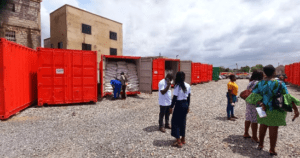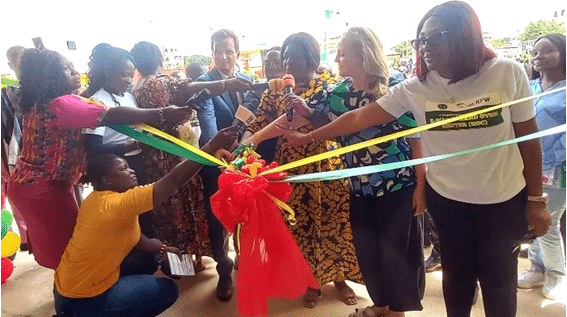By Deborah Asantewaah SARFO
Government, through Minister of Environment, Science, Technology and Innovation (MESTI) Ophelia Mensah Hayford, has inaugurated an E-waste Hand Over Centre (HOC) to enhance managing electrical and electronic waste (e-waste) in a manner that’s sustainable and environmentally friendly to the country.

The Centre seeks to address improper handling and management of e-waste by scrap collectors through burning, which exposes citizens to many health issues and pollutes the environment. It serves as a storage facility for all e-waste materials received from the informal sector and auctions them to recycling firms.
“Today marks a significant milestone in Ghana’s efforts to promote Environmentally Sound Management of Waste Electrical and Electronic Equipment. It is therefore a great privilege to stand before you as we officially commission the E-waste Hand Over Centre – a significant achievement in our quest for sustainable management of electronic waste in the country,” the minister noted.
The facility sits on 2.5 acres of land at Haatso, Accra, given to the ministry and government by the Ghana Atomic Energy Commission (GAEC). It has a hall of about 1,500 square metres, 2 offices, a hazardous area and a laboratory for testing the four defined e-waste materials – cables, mixed batteries, thermoplastics and Cathode Ray Televisions (CRTs).
According to Ms. Hayford, the HOC is not only a storage centre for e-waste but also symbolises government’s commitment to protecting the environment and public health.
She added that government hopes the facility will strengthen the capacity of local e-waste handlers to properly manage electronic waste in ways which reduce associated risks and increase value recovery.
Background
The minister emphasised that widespread media coverage which described Aboglobloshie as one of the largest e-waste dumping sites and most polluted areas in the world, coupled with the international outcry, “brought much-needed attention to the urgent need for sustainable and environmentally sound management of e-waste”.
The HOC forms part of activities implemented under the ‘Recycling and Disposal of Waste of Electrical and Electronic Equipment in an Environmentally Sound manner’ project, constructed through collaboration between government through MESTI and the German government through KfW.
The KfW-funded project is part of activities that emerged from passage of the Hazardous and Electronic Waste Control and Management Act (ACT 917) in 2016. Its duration was done in two phases that is 2018 – 2022 and 2023-2025 with each phase having a budget of €10million.
Highlighting some achievements of the project in addressing improper disposal of e-waste, Ms. Hayford said since its inception in 2018 it has collected over 476.88 tonnes of e-waste cables, 37.03 tonnes of mixed batteries, 31.83 tonnes of thermoplastics and 87 Cathode Ray Television (CRT) sets.
HOC contributions to sustainable e-waste management
Dr. Vincent Kyere, Team leader for the project, explained that they are mainly focused on collecting the most hazardous e-waste from informal operators and have so far received about 718 tonnes.
Of the e-waste received, he noted that they have tendered about 100 tonnes to local recycling, adding that “we spent about GH¢6.5million on incentivising the informal sector for collection of e-waste products”.
Explaining processes that take place at the HOC, he said they first of all weigh e-waste items, offload them to a specific area, separate them into the various four categories, bag and store them in containers – and later auction them to recycling firms.
In response to how they set prices for the waste end-products, he said they use market surveys at scrapyards and look at prices on the international market.
He noted that they also negotiate and review the prices local operators until they arrive at a price agreeable to both sides, stressing “This kind of procurement is different”.
Taking her turn, Director-Policy, Planning, Monitoring and Evaluation (PPME) MESTI – who doubles as the Project Coordinator, Lydia Essuah emphasised that the project seeks to empower informal sector operators, not to deprive them of their livelihoods.
Ms. Essuah noted that they have received e-waste from 569 individuals in the Greater Accra, Eastern, Northern and Upper West Regions.
She added that some recycling firms cannot recycle the product, hence “they are working with partners to ensure such firms are given the necessary technical and financial support to recycle the products once they are collected”.
In a speech read on his behalf, German Ambassador Daniel Krull stated that the facility will aid by providing a higher quantity of materials needed for electronic appliances.
“It is evident that as the world moves toward the digital age there will be an increase in demand for electronic appliances. This will obviously lead to a higher quantity of output. Finally, by reusing these materials, the need for mining new raw materials can be significantly reduced – and this will be vital in the future,“ he stated. He indicated that his country is excited about their support toward this project, urging citizens to support the project and help reduce harmful effects from e-waste.










